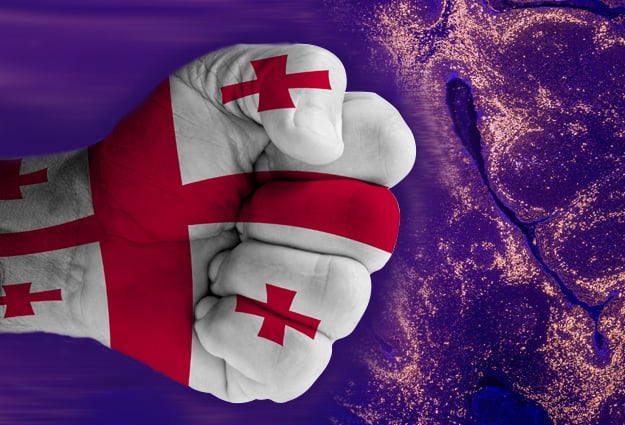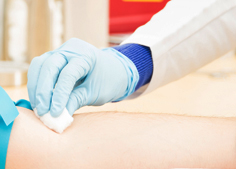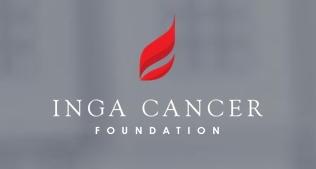
At Beekley, it’s not uncommon for us to come across inspiring stories about patients and physicians fighting cancer. Sometimes they’re so inspiring that we have to share them.
Meet Dr. Krystyna Kiel, a radiation oncologist who retired from Rush University Medical Center in 2015 after forty years of practice.
A Country in Need of Cancer Specialists
 Dr. Kiel was invited to the Republic of Georgia by a physicist and colleague to help improve the state of cancer care in that country.
Dr. Kiel was invited to the Republic of Georgia by a physicist and colleague to help improve the state of cancer care in that country.
For over 15 years the Republic of Georgia has been making a concerted effort to reform its healthcare system. Among the focus of these reforms are improving the capacity of medical professionals and implementing enhanced cancer prevention, screening, and treatment programs,.
Cancer is the third leading cause of death in the Republic of Georgia. Most patients only present in the late stages when the tumor is visible. According to the World Health Organization, the mortality rate is 60 percent for those diagnosed. Some of the reasons behind this high morbidity rate and late stage detection include low health literacy regarding cancer prevention among the population and lack of knowledge regarding early signs and symptoms among primary care providers.
Evex Medical Corporation, founded in 2012, is the leading provider of healthcare services in the Republic of Georgia and is dedicated to providing and strengthening quality healthcare delivery with the expansion of primary, secondary and tertiary facilities across the country and an emphasis on evidence-based medicine, teams of skilled medical professionals, modern technology and equipment, geographic convenience, and attention to patient care and experience.
In the spring of 2015, Evex had just opened the the largest oncological center in western Georgia. The center was equipped with the most modern methods for cancer treatment, however, since the physicians had only a few months experience with these treatment methods, Evex asked leading specialists from across the globe to supervise the radiation and medical oncology departments. Dr. Kiel was one of those specialists asked to help train and mentor the radiation oncology staff.
Medical Culture Shock
Dr. Kiel dove right in and made the trip to Georgia. She was immediately struck by the lack of availability of common medical supplies that we take for granted here in the United States.
“Practicing medicine in Georgia is very different from the United States,” Dr. Kiel told us. “In the United States, I wasn’t unique. You won’t have much trouble finding another radiation oncologist. In Georgia, it’s not so easy. Simple tasks suddenly become difficult - for example: how do I remove the Aquaplast mask from the oven? My solution was to use ‘spaghetti tongs'. And if you don’t speak the Georgian language you’re going to have an ‘interesting’ shopping trip. We needed lubricants for gynecological examinations, but they just didn't exist. We went to the pharmacy and ‘mimed’ lubricants. They came out with a jar of MAM Powder which is baby formula.”
 Undeterred, she made things work. “I learned early on that when I visit I should load up on supplies. Things like a bolus, alcohol wipes, or lubricant aren’t easy to find.”
Undeterred, she made things work. “I learned early on that when I visit I should load up on supplies. Things like a bolus, alcohol wipes, or lubricant aren’t easy to find.”
Aside from the language barrier, Dr. Kiel was also faced with enormous cultural differences regarding attitudes towards cancer.
“It is taboo to even utter the word ‘cancer,’” she explained. “Doctors are not allowed to tell patients they have a tumor. It’s up to family to explain the diagnosis. Usually, the family will tell the patient they have an ulcer. Female patients face a different challenge. Gynecologists won’t take out the whole cervix when they find an endometrial cancer. They are afraid the woman won’t be considered ‘desirable’ as a sexual partner, so instead, they remove the upper half of the cervix and leave the tumor in the bottom half in the patient. It just makes no sense to our western sensibilities. Radiation therapy is the primary treatment. If I wasn’t there, I’m not sure these patients would be getting the treatment they need.”
Training the Next Generation of Physicians
Dr. Kiel’s greatest focus has been on guiding and advising the medical team, imparting her experience and “common-sense” approaches to the young staff.
“I started with training them to manage cancer and the different cancer types. Things like how to treat elderly patients and when radiation therapy is appropriate. I also introduced them to professional skin markers for treatment planning. They had been using BBs or pencil erasers for three-point setups. They would cut up bread ties for wires. It’s just not ideal to put a lot of tape on an ulcerated mass - it gets yuckier. The team really likes Beekley's CT-SPOT® pellet and line markers. They’re more exact, precise, and the wire curves when you want it to. It makes a big difference.”
Kiel has made three trips to Georgia since 2015. However, most of her work is done remote from Chicago.
“I have a conference call once a week with physicians to review new patients. I check contours and treatment plans and the physicians ask me advice daily. I check plans in the evening because of the time difference and remote into their treatment planning system. The staff will leave me questions and I’ll leave advice.”
Increasing Access to Treatment
Dr. Kiel’s work is not limited to training physicians and treating patients. She is also a strong advocate for public access to better care.
“A consultation in Georgia costs a patient somewhere between five and ten dollars. It's cheap to see a physician. But when the physician recommends radiation therapy, the patient must get coverage approved by the government.”
In 2013, the Republic of Georgia introduced universal healthcare which covers 80 percent of radiation therapy treatment costs. However, patients are still required to pay the hospital the remaining $400 to $1,000 before treatment even begins. The average monthly salary in Georgia is $410.
“Thirty percent of patients don’t come back because treatment is unaffordable. It’s tragic. Think about it: a patient 36-year-old with cervix carcinoma just won’t come back. They are going to die.”
Dr. Kiel told us that many patients cope with the financial burden by selling belongings to pay for treatment. “I remember going to a currency exchange (which also operates a pawn shop). The patient I’d seen earlier was pawning a gold ring, his wedding ring. I suspect that was for radiation therapy.”
 To help bridge this gap between insurance coverage and the patient's ability to pay for treatment, Dr. Kiel and her colleagues founded the Inga Cancer Foundation in 2016. The foundation’s mission is to “eliminate the financial gap so every eligible patient can obtain treatment and achieve cure rates seen in the Western World.”
To help bridge this gap between insurance coverage and the patient's ability to pay for treatment, Dr. Kiel and her colleagues founded the Inga Cancer Foundation in 2016. The foundation’s mission is to “eliminate the financial gap so every eligible patient can obtain treatment and achieve cure rates seen in the Western World.”
Leaving A Legacy
Dr. Kiel is among the many helping the Republic of Georgia to make an impactful difference in the country's cancer care. With the government’s increased emphasis on early screening, she looks forward to seeing lower mortality rates. “I’m just driven to help train and nurture these young physicians so that they can carry on the fight against cancer. If I can teach them some good habits and train them to develop a well thought out evidence-based treatment plan, I’ve done my job. This will be my legacy in the world.”
Related articles:

Jonathan McCullough
Product Manager

